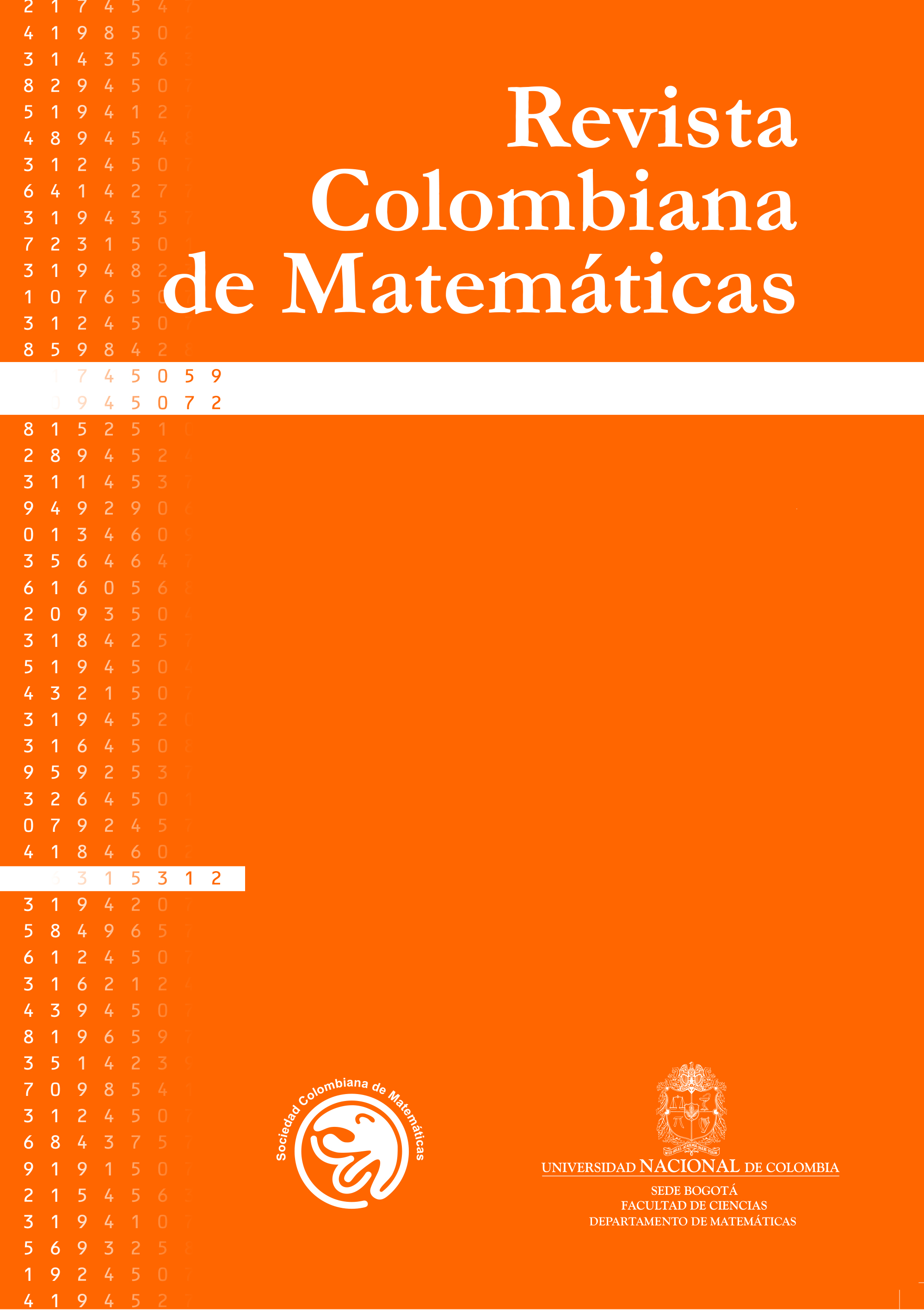A Glivenko-Cantelli Bootstrap Theorem for the Foster-Greer-Thorbecke Poverty Index
Un Teorema Glivenko-Cantelli Bootstrap para la Medida de Pobreza de Foster-Greer-Thorbecke
DOI:
https://doi.org/10.15446/recolma.v54n2.93845Palabras clave:
Foster-Greer-Thorbecke poverty index, convergence of empirical processes, Glivenko-Cantelli classes, bootstrap empirical processes (en)Indicador de pobreza de Foster-Greer-Thorbecke, convergencia de procesos empíricos, clases Glivenko-Cantelli, procesos empíricos bootstrap (es)
Descargas
Abstract.We assume the Foster-Greer-Thorbecke (FGT) poverty index as an empirical process indexed by a particular Glivenko-Cantelli class or collection of functions and define this poverty index as a functional empirical process of the bootstrap type, to show that the outer almost sure convergence of the FGT empirical process is a necessary and sufficient condition for the outer almost sure convergence of the FGT bootstrap empirical process; that is: both processes are asymptotically equivalent respect to this type of convergence.
Asumimos el indicador de pobreza de Foster-Greer-Thorbe\-cke (FGT) como un proceso empírico indexado por una particular clase o colección de funciones Glivenko-Cantelli y definimos este indicador de pobreza como un proceso empírico funcional del tipo bootstrap, para probar que la convergencia casi segura exterior del proceso empírico FGT es una condición necesaria y suficiente para la convergencia casi segura exterior del proceso empírico bootstrap FGT; esto es: ambos procesos son asintóticamente equivalentes respecto de este tipo de convergencia.
Referencias
K. B. Athreya and S. N. Lahiri, Measure theory and probability theory, Springer, New York, 2006.
G. Cheng and J. Z. Huang, Bootstrap consistency for general semiparametric m-estimation, The Annals of Statistics 38 (2010), no. 5, 2884-2915. DOI: https://doi.org/10.1214/10-AOS809
G. Dierickx, Limit theorems for general empirical processes, Master thesis in mathematics, Vrije Universiteit Brussel, may 2012.
R. M. Dudley, Uniform central limit theorems, Cambridge Studies in advanced mathematics, 1999. DOI: https://doi.org/10.1017/CBO9780511665622
B. Efron, Bootstrap methods: Another look at the jacknife, The Annals of Statistics 7 (1979), 1-26. DOI: https://doi.org/10.1214/aos/1176344552
B. Efron, The jacknife, the bootstrap and other resampling plans, SIAM, Philadelphia, 1982. DOI: https://doi.org/10.1137/1.9781611970319
J. Foster, J. Greer, and E. Thorbecke, A class of decomposable poverty measures, Econometrica 52 (1984), no. 3, 761-766. DOI: https://doi.org/10.2307/1913475
E. Giné, Empirical processes and applications: an overview, Bernoulli 2 (1996), no. 1, 1-28. DOI: https://doi.org/10.2307/3318565
E. Giné and R. Nickl, Mathematical foundations of infinite-dimensional statistical models, Cambridge University Press, 2015. DOI: https://doi.org/10.1017/CBO9781107337862
E. Giné and J. Zinn, Bootstrapping general empirical measures, The Annals of Probability 18 (1990), no. 2, 851-869. DOI: https://doi.org/10.1214/aop/1176990862
P. Harmath, Análisis y estimación de medidas de pobreza unidimensionales bajo la teoría de procesos empíricos bootstrap, Tesis doctoral en matemáticas, Universidad Centroccidental Lisandro Alvarado, enero 2018.
P. Harmath, A. Monsalve, and J. Ramoni, Medición, método axiomático y medidas de pobreza: Una revisión, Revista de Matemáticas de la Universidad del Atlántico 4 (2017), no. 1, 1-15.
M. R. Kosorok, Introduction to empirical processes and semipara-metric inference, Springer, New York, 2006.
G. Samb Lo and Ch. Tidiane Seck, Uniform convergence of the non-weighted poverty measures, Communications in Statistics-Theory and Methods 38 (2009), no. 20, 3697-3704. DOI: https://doi.org/10.1080/03610920802645387
J. Praestgaard and J. A. Wellner, Exchangeably weighted bootstraps of the general empirical process, The Annals of Probability 21 (1993), no. 4, 2053-2086. DOI: https://doi.org/10.1214/aop/1176989011
L. Rincón, Introducción a los procesos estocásticos, Departamento de Matemáticas, Facultad de Ciencias UNAM, México DF, 2012.
Ch. Tidiane Seck, Estimation non-paramétrique et convergence faible des mesures de pauvreté, Thèse de doctorat, Université Pierre et Marie Curie, mars 2011.
A. Sen, Poverty: an ordinal approach to measurement, Econometrica 44 (1976), no. 2, 219-231. DOI: https://doi.org/10.2307/1912718
F. Strobl, On the reversed sub-martingale property of empirical discrepancies in arbitrary sample spaces, Journal of Theoretical Probability 8 (1995), no. 4, 825-831. DOI: https://doi.org/10.1007/BF02410114
A. W. van der Vaart and J. A. Wellner, Weak convergence and empirical processes with applications to statistics, Springer-Verlag, New York, 1996. DOI: https://doi.org/10.1007/978-1-4757-2545-2
J. A. Wellner, Some converse limit theorems for exchangeable bootstraps, The Institute of Mathematical Statistics Lecture Notes-Monograph Series 36 (2001), 593-606. DOI: https://doi.org/10.1214/lnms/1215090092
B. Zheng, Aggregate poverty measures, Journal of Economic Surveys 11 (1997), no. 2, 123-162. DOI: https://doi.org/10.1111/1467-6419.00028













